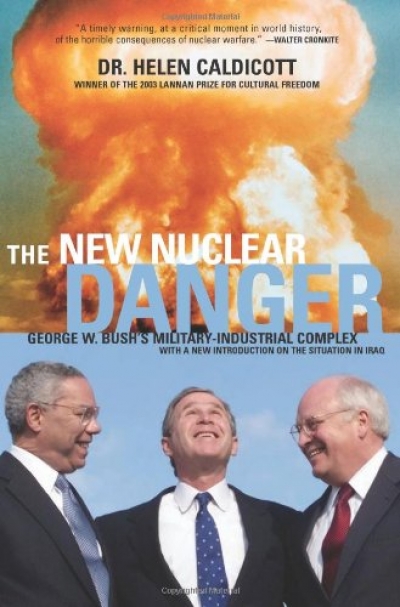



On March 1, Russian president Vladimir Putin, having accepted President AliAlkhanov’s resignation two weeks earlier, nominated acting president Ramzan Kadyrov (pic right, with Putin) for the presidency of Chechnya. Shakhid Dzhamaldayev and Muslim Khuchiyev were also nominated as a purely formal gesture. The next day, the nominations were taken to the Chechen parliament, where Kadyrov was confirmed as the next president; 56 of the 58 votes cast were for the Kremlin-backed Kadyrov, one MP voted against and one abstained.
The New Nuclear Danger: George W. Bush’s Military-Industrial Complex by Dr Helen Caldicott. Pub: The New Press, New York, 2004. Pp: 304. Pbk: US$17.95.
Medical Aid & Relief for the Children of Chechnya (MARCCH) is a London-based humanitarian organisation dedicated to bringing relief to children who have been injured as a result of the conflicts in Chechnya. Their projects have included taking children to Italy to be fitted with prosthetic limbs, providing financial help to an orphanage in Chechnya, and providing syringes and vaccines to fight tuberculosis. They will shortly begin fundraising for filtration machines for hospitals in Grozny. MARCCH visit Chechnya regularly to make sure their projects are being run properly by their local contacts. HAJIRA QURESHI of Crescent International interviews Satanay Dorken, chief executive of MARCCH, who has recently returned from Chechnya.
Although the recent assassinations of Anna Politkovskaya and Alexander Litvinenko have failed to draw international condemnation for Russian prime minister Victor Putin, they ought to draw attention to the continuing war in Chechnya. HAJIRA QURESHI of the SCC looks forward to World Chechnya Day.
People all over the world held events on February 23 to remember the tragedy of the Chechen people, after the Save Chechnya Campaign, a support and advocacy body based in London, led a campaign to have February 23, the date of Stalin’s deportation of the Chencens to Central Asia in 1944, proclaimed as World Chechnya Day.
‘THE OATH’: A SURGEON UNDER FIRE by Khassan Baiev with Ruth and Nicholas Daniloff. Pub: Walker & Company, New York, USA, 2003. $26.00 "Two reasons motivated me to write The Oath. First, I wanted the world to know that war is a hellish thing that victimizes the innocent. In war there are no winners. Secondly, and equally important, I wanted to introduce my readers to the Chechen people." -- Dr Khassan Baiev, The Oath
Because president Vladimir Putin cannot be elected for a third term unless the Russian constitution is amended, he and Kremlin officials are preoccupied with the parliamentary elections in2007 and with ensuring the election of an approved successor as president in 2008.
Since the collapse of the Soviet Union in 1991, Russia has been striving to retain its control of the new Central Asian republics, among them Kyrgyzstan, Azerbaijan and Tajikistan. The UShas been trying very hard to replace Moscow's influence with its own; it has succeeded in acquiring, for example, a military base in Kyrgyzstan alongside Russia's.
Aslan Maskhadov, the exiled leader of the Chechen independence movement, last month urged the Kremlin to begin talks to end a decade of conflict. The call for peace talks came as local officials admitted that the ceasefire Maskhadov had ordered earlier had been effective.
Since 1967 Israel has been occupying the Golan Heights, which are a Syrian territory wrenched away in a war that has not formally ended; Syria has good legal, moral and political reasons to try to recover its land.
The assassination of Ahmed Kadyrov, Chechnya's pro-Kremlin president, on May 9 has thrown into chaos president Vladimir Putin's plans for ending the Chechen resistance to Russian imperialism...
Muslims in the Russian Federation and in China – who are pursuing their ‘universal right’ to self-determination in the face of horrendous opposition – were probably not surprised by the abrupt way in which moves in the UN to condemn violations of human rights in China and by Russia were blocked...
Russian president Vladimir Putin got more than he bargained for during his first-ever trip to Malaysia on August 5, as part of his effort to increase the sales of Russian arms in this part of the world.
Endgame: Britain, Russia and the Final Struggle for Central Asia by Jennifer Siegel. Pub: I. B. Tauris & Co., London, 2002. Pp: 284. Hbk: $29.50.
The only Russian officer to be charged for war crimes in Chechnya has been acquitted on the basis that he raped and murdered a teenaged girl while suffering from temporary insanity. Colonel Yury Budanov was cleared of all charges against him on December 31.
The crash of a Russian army helicopter on August 19 near Johar-Gala (Grozny, the capital of Chechnya, also known as Ichkeria), in which at least 114 Russian soldiers, many of them officers, died, was a great embarrassment both to the military and to president Vladimir Putin.
The presidents of the five Caspian Sea littoral countries ended a two-day summit in Ashgabat, the Turkmen capital, on April 24 without reaching any agreement on how to share the Caspian and its rich hydrocarbon reserves.
Tatarastan, the only Muslim republic still in the Russian Federation, is losing the autonomy that it gained in 1991 after the dissolution of the Soviet Union and had consolidated since then. It has also been forced to put on hold the legislation it passed in early 2001, in defiance of Russian objections...
Vladimir Putin — a former KGB operative plucked from obscurity by President Boris Yeltsin, who appointed him prime minister of Russia — used the Chechen war to secure his election as president in March 2000, and continues to exploit it to maintain his popularity while conceding privately that victory is not on the cards.
The former Soviet republics of Central Asia are not teeming with US servicemen, but more than 1,000 troops are based in Uzbekistan, and US forces have been allowed to use air-bases in Tajikistan and Kyrgyzstan.

